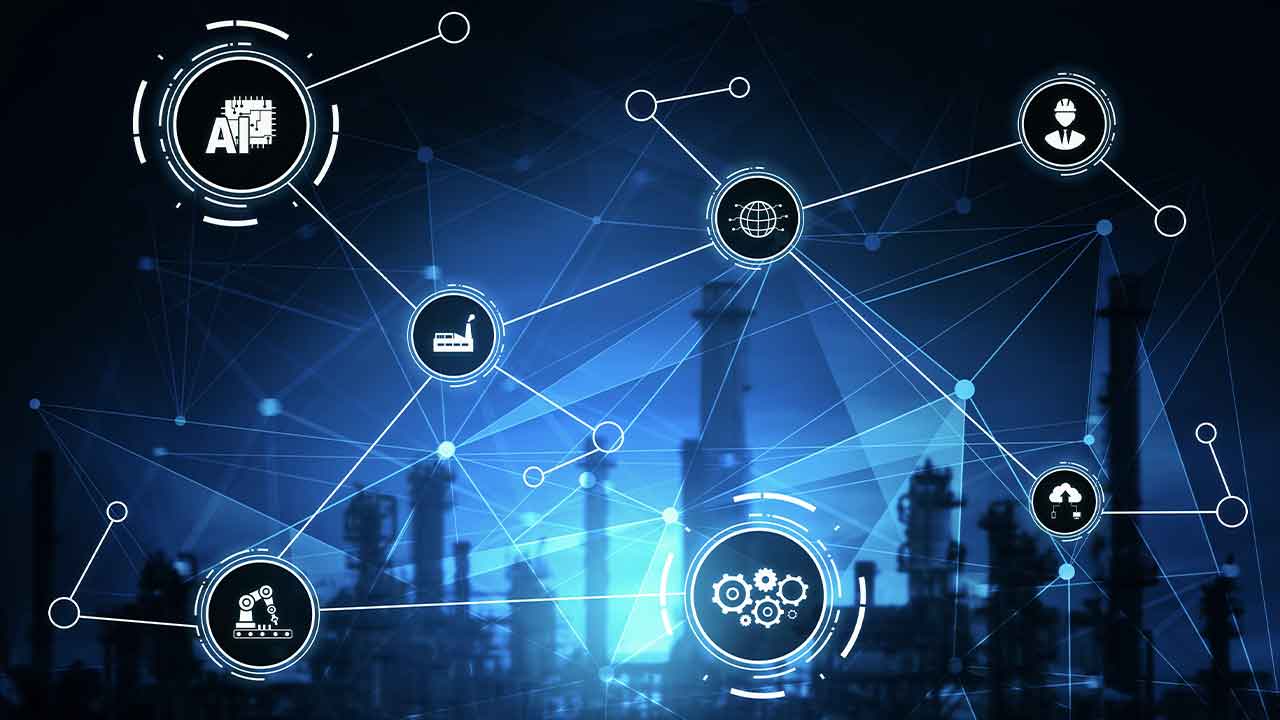Nine challenges of Industry 4.0
“We must develop a comprehensive and globally shared view of how technology is affecting our lives and reshaping our economic, social, cultural, and human environments. There has never been a time of greater promise, or greater peril.” — Klaus Schwab
We are in the midst of the fourth industrial revolution, or Industry 4.0 as its more commonly known. Of course, with a great opportunity, comes great challenges. But before we delve any deeper, let’s look at what Industry 4.0 is in a nutshell.
What is Industry 4.0
Industry 4.0 is the ongoing automation of information and data exchange in manufacturing technologies. The notion includes cyber-physical systems, the Internet of things (IoT) and cloud computing.
In essence, Industry 4.0 creates what has been called a smart factory.
To elaborate, digital technology has changed the face of industrial and manufacturing world. The convergence of IoT, Artificial Intelligence and robots, among other advancements, has enabled smart factories as well as the quantum leap into Industry 4.0.
This involves the integration of the physical and software in production, as well as the service sector. Amazon, Uber, Facebook, ‘smart factories’ and 3D printing, are among modern pioneers of the new industrial revolution.
Find out more about Amazon Digital Transformation Success
Industry 4.0 is coming fast and to compete in tomorrow’s world, and beyond, tech companies must evolve with the times. As Industry 4.0 continues to change the way we interact with the world around us, new challenges arise. So, the question is: are you ready for Industry 4.0? And what challenges will you face in the near future of IIoT.
Let’s take a look.
Industry 4.0 challenges:
Here are the main Industry 4.0 challenges you may face in the not so distant future:
● New business models — the definition of a new strategy
● Rethinking your organization and processes to maximise new outcomes
● Understanding your business case
● Conducting successful pilots
● Helping your organization to understand where action is needed
● Change management, something that is too often overlooked
● Examination of company culture
● The genuine interconnection of all departments
● Recruiting and developing new talent
The Internet of Things (IoT) will connect machines and systems and allow seamless data transmission across all departments of a workplace, opening up opportunities for entirely new business models in manufacturing, computing, and many other industries.
Talking to the Strait Times about the manufacturing sector, IoT expert Dr Gunther Kegel explained, “A device originally used for simple protection can now provide data, which can, for instance, be sold to insurance companies. All of a sudden, your business model is completely different.”
To thrive and indeed survive in tomorrow’s world, you will need to look at each of the above challenges and act upon them as soon as possible. But, it’s important to remember that above all, Industry 4.0 requires businesses and organisations to adopt a fresh thinking mindset, understanding the power of the inter-connectivity realised by new technologies.
By being able to adopt a new mindset, refresh your company culture, adapt your business model, create new roles and nurture the talent to fulfil those roles, the rest will follow, as long as your change is managed closely throughout the process.
Benefits of Industry 4.0:
Similar to digital transformation, the benefits of Industry 4.0 will ultimately help a business become smarter and more efficient. Here are the key benefits of the new industrial revolution…
● Enhanced productivity through optimisation and automation
● Real-time data for real-time supply chains in a real-time economy
● Greater business continuity through advanced maintenance and monitoring possibilities
● Higher quality products as a result of real-time monitoring, IoT-enabled quality improvement and cobots
● Better working conditions and superior sustainability
● Personalisation opportunities that will earn the trust and loyalty the modern consumer
With an understanding of what you have to gain from harnessing the power of Industry 4.0, taking the actions required to realise it will be all the more easier.
It’s true that Industry 4.0 comes with its fair share of challenges, but by facing them head on it’s clear to see that you have everything to gain. Also, you can check Four key challenges for power generation companies.
Industrie 4.0 Is All About Speed
Visit four doctors, and you’ll come home with five diagnoses.
This saying can be transferred to the term Industry 4.0, where everybody has its own definition.
Back in 2011 when the term Industrie 4.0 was introduced by the German government institution BMBF, the idea was very unique. It describes the fourth industrial revolution (after steam, mass production, and computer).
Nowadays exist many similar approaches. Examples are the Industrial Internet of Things (IIoT), Industrie 2025, Made in China 2025, Industrial Internet, Digital Factory and Smart Factory.
Above all, this article will not add another definition to the pool. It will rather try to answer the following questions:
- What is the value proposition of Industrie 4.0?
- Moreover, how could it possibly be set free?
Literature agrees on the point that Industrie 4.0 wants to push the digitalization of the manufacturing. Further clear points are higher transparency, interoperability, better technical assistance, and decentralization. However, none of these points are value propositions.
My German compatriots tend to approach things from the bottom up. As a result, we prefer to start with the technical solution and expect that the business will flourish on it.
Furthermore, this is also the reason why, if asked for a definition of Industrie 4.0, most people name technologies like Artificial Intelligence (AI) or mechanisms like cyber-physical systems (CPS). The list could go on endlessly with hip and fancy stuff like 5G, Augmented Reality (AR) and Virtual Reality (VR), BigData, Blockchain and so on.
Likewise, a lot of promising methods and approaches exist on the project management and organizational side.
However, these technologies and methods can only form the foundation. As already mentioned, the question should be first WHAT? and then HOW?
So, now what is our value proposition of Industrie 4.0?
The Value Proposition Of Industrie 4.0
To answer these questions, we look at the origins of Industrie 4.0: The Manufacturing.
Manufacturing is always cost-driven. Therefore, the value proposition needs to have to do something with productivity gains and cost reductions. A look into manufacturing units reveals, that most are doing optimizations, regarding cost-reduction and productivity gains, for many years already. It is part of their DNA.
Without this continual improvement process, competitors would instantly win ground. Lower manufacturing costs lead to higher margins. Hence, more market share in the end.
Here comes Industrie 4.0 into play. If the improvement cycle is the key factor for the long-term success of a manufacturing unit, then Industrie 4.0 must improve it. Certainly one of the first thoughts is speeding it up. Therefore allowing manufacturing units to evolve faster than the competition. Another improvement is to make the continual improvement process better quality-wise. Both approaches are based on transparency.
Setting It Free
Transparency about the manufacturing production processes plays a key role. I once had a chat with a general manager about Industrie 4.0. To the point, I told him it was about speed. To evolve faster than the competition. With fervor, he said, “No, it’s about data.” Of course, it is about data.
Nevertheless, data is only the starting point. Data helps you to understand your processes and see the gaps and gains. Certainly, some kind of data scientist is required at this point. For some companies, this might be a production engineer and for SMEs, this might just be a role.
Above all transparency is the fuel of Industrie 4.0. At the latest when preparing the project and task list for the continual improvement, process it must be clear WHAT is to be done. And in which order. Consequently the higher the level of transparency, the higher the likelihood that the right things will be addressed.
With the technology foundation and the newly gained transparency, the continual improvement process will earn more and more fruits in shorter periods.
Manufacturing units with such a mindset will evolve faster than their competitor.
Furthermore, productivity rises disproportionately and manufacturing costs are lowered. Finally, this will help the company to gain more market share.
For making use of the speed of Industrie 4.0, everything has to work hand in hand: Process, Organization, and Technology.
Lean processes supported by an agile organization and software being developed and deployed following DevOps principles should be the vision. Small steps in this direction help already.
IIoT Platforms
Most recently, IIoT platforms are somewhat of a hype. However, they can be beneficial at this point.
Especially small and medium-sized enterprises (SMEs), with a very limited budget, should have a look at a scalable, fair and open IIoT Platform like ScaleIt. As a project member and lead for my company, I can only recommend having a look.
As software eats the world, a main driver of the digital transformation and Industrie 4.0 is software. But choosing the right fundament for manufacturing software wise is another article.
FAQs about Industry 4.0 Challenges
What are Industry 4.0 problems?
Industry 4.0 problems include concerns about cybersecurity, data privacy, workforce displacement due to automation, and the need for substantial investments in technology and training.
Is Industry 4.0 good or bad?
Industry 4.0 has both positive and negative aspects. It offers improved efficiency, innovation, and competitiveness, but it also brings challenges such as job displacement, cybersecurity threats, and the digital divide.
What is Industry 4.0 industrial revolution and its consequences?
Industry 4.0 is the fourth industrial revolution characterized by the integration of digital technologies into manufacturing. Its consequences include increased automation, data-driven decision-making, and the transformation of traditional business models.
What are the challenges of Industry 4.0 in supply chain?
Challenges of Industry 4.0 in the supply chain include the need for advanced data analytics, integration of IoT devices, cybersecurity risks, adapting to new technologies, and ensuring the resilience of digital supply chain networks.
What are the challenges of the 4th industrial revolution?
Challenges of the 4th industrial revolution include addressing ethical concerns related to artificial intelligence, upskilling the workforce for jobs in a digital economy, managing data privacy, and ensuring equitable access to technology.
 The article was written by Mustapha Zaouini and originally was published here. Mustapha is a Tech Entrepreneur, Investor, Leading Executive specializing in growth strategies & new emerging markets development (Africa & Middle East).
The article was written by Mustapha Zaouini and originally was published here. Mustapha is a Tech Entrepreneur, Investor, Leading Executive specializing in growth strategies & new emerging markets development (Africa & Middle East).


